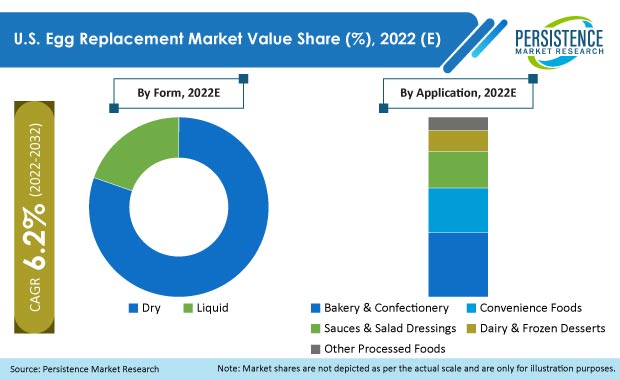U.S. Egg Replacement Market Segmented By Plant-protein Blends, Polysaccharides/Starch/Hydrocolloids-based, Legume-based, Soy-based, Yeast-based Ingredient Type In Dry and Liquid Form
Industry: Food and Beverages
Published Date: August-2022
Format: PPT*, PDF, EXCEL
Delivery Timelines: Contact Sales
Number of Pages: 300
Report ID: PMRREP33144
The U.S. egg replacement market is valued at US$ 229.5 in 2022 and is expected to expand at a CAGR of 6.2% to reach US$ 419.2 Mn by 2032.
Consumption of egg replacements in the U.S. is predicted to increase at a volume CAGR of 5.2% to reach 34,152 tons by the end of 2032.
| Report Attribute | Details |
|---|---|
|
U.S. Egg Replacement Market Size (2021) |
US$ 218.1 Mn |
|
Estimated Market Value (2022E) |
US$ 229.5 Mn |
|
Projected Sales of Egg Replacements (2032F) |
US$ 419.2 Mn |
|
Market Growth Rate (2022-2032) |
6.2% CAGR |
|
Dry Egg Replacement (2022) |
17,522 Tons |
The U.S. egg replacement market was valued at US$ 218.1 Mn in 2021 after having registered a value CAGR of 4.9% during the historical period (2017-2021).
Egg replacements are primarily plant-based eggs mainly developed to reduce the consumption of eggs. Plant-based eggs possess similar properties to eggs such as binding properties, and high protein, vitamins, minerals, and nutritional content.
Demand for vegan eggs is being fuelled due to rising concerns about obesity, cardiovascular diseases, and other ailments caused due to animal-based products. Furthermore, the vegan initiative taken by various societies is making people shift from animal-based diets to plant-based/ vegan diets.
Strengthening partnerships among distributors and manufacturers is pushing the egg replacement market in the United States in the forward direction. Manufacturers are striving to expand their product offerings with product innovations such as identifying novel natural ingredients or sources for egg replacers and improvised taste and texture to be identical to eggs.
Market players are also launching different variants of egg replacers to cater to the evolving needs of manufacturers seeking low-cost ingredients as well as for customers looking for various healthy food products.
The U.S. market for egg replacements is expected to offer an incremental opportunity of US$ 189.7 Mn by 2032.

“Rising Inclination toward Vegetarian/Vegan Products Driving Demand for Egg Alternatives”
The potential likelihood of the impact on vegan or vegetarian food products is expanding worldwide. Customer demand for vegan foods has been supported by increasing awareness of healthier eating options. This is attributed to several diseases affecting animals as well as growing concerns about animal welfare.
“Gluten-Free, Non-GMO Egg Replacement Ingredients - An Emerging Trend”
Owing to the rising incidence of health issues such as obesity, diabetes, blood pressure, and others, consumers are more inclined toward maintaining a healthy lifestyle. They are seeking gluten-free food products, especially bakery products. This has led many manufacturers to expand their product offerings by introducing gluten-free and non–GMO egg replacement ingredient solutions.
“Increased Cost of Eggs to Benefit Demand Growth for Egg Replacement Products”
Egg prices are rising significantly due to supply constraints, which have occurred due to the avian flu. Thus, many food manufacturers are seeking to control costs by reducing the egg content in their products, which is a factor driving market growth.
In 2015, it was estimated that the price of eggs increased by 80%, due to avian flu in the U.S. Retail egg prices rose from an average of US$ 1.22 per dozen in mid-May 2015 to US$ 1.95 in June 2015 in the country, which was an increase of approximately 60% in just a month.
Even in recent years, the price of eggs has been increasing by approximately 35% to 50% in the U.S. every year, which will be a concerning issue for several food service industry players.
“Production & Handling of Eggs – Matter of Concern”
Apart from consumer concerns, complicated egg processing methods, food safety related to egg handling, expensive chilled egg storage, consumer demand for cage-free eggs, and various other factors are prompting food manufacturers to invest in simplified alternatives.
Moreover, a major factor limiting the use of eggs is their relatively short shelf life. However, the shelf life of egg replacers is an average, of three years, and is easy to process, handle, and store. This is a primary factor influencing food manufacturers to opt for egg replacers in their products.
“Availability of Egg Substitutes at Lower Prices”
Egg replacers are derived from various plant-based sources such as wheat, corn, potatoes, soy, algae, and others. These are easily available raw materials at a low cost. These are commonly grown food crops in almost all parts of the world.
These plants are known to adapt to a range of climatic conditions. As a result, the cultivation of these grains is economic, and easy for manufacturers to produce egg substitutes at low prices.
Owing to versatile properties and nutritional importance, plant-based egg replacers for the bakery industry are gaining popularity, and growers are encouraged to increase cultivation.
“Negative Perception Regarding Plant-based Egg Replacers”
Consumers across the world are looking for more proteins in their diets, for which, they include eggs in several dishes; however, there is a lack of familiarity with plant-based proteins among consumers.
Some consumers find it undesirable to consume due to the texture and taste of plant-based egg replacers. They have the perception that plant-based proteins are hard to find and are not as nourishing as animal-based proteins. Such a negative perception and lack of awareness of vegan/plant-based egg replacers are restricting the market from reaching its full potential.
“Population Allergic to Soy & Pea Sources”
Prime sources of egg replacers are soy and pea, as they are rich in protein content and give a similar taste and texture of eggs. Sensitivity toward soy causes a hyper reaction of the immune system and sometimes even leads to anaphylaxis, which is a medical emergency and needs immediate treatment and attention.
The population sensitive toward soy and peas is increasing globally, as one in ten adults is suffering from sensitivity toward allergens such as soy and peas, and over 50% face high severity. Manufacturers are striving to produce allergen-free egg replacers so that the population suffering from soy and peas allergies can consume these products.
Why are Dry Egg Replacements Popular in the U.S. Market?
Dry egg replacements have higher potential due to easy logistics, lower packaging costs, and user-friendly applications.
The market share of dry egg replacers is estimated to be around 80.3% in 2022 and the segment is expected to increase by value CAGR of 6.4% during the forecast period.
Which Ingredient Type in Egg Replacements is Majorly Demanded in the U.S.?
Based on ingredient type, the market is divided into five distinct segments - plant-protein blends, polysaccharides/starch/hydrocolloids-based, legume-based, soy-based, yeast-based, and others.
Plant-protein blends hold 35.1% market share, followed by legume-based and polysaccharides/starch/hydrocolloid-based egg replacements.
In Which Application are Egg Replacements Most Widely Used?
The bakery & confectionery industry holds a major value share of approximately 35.9% of the U.S. egg replacement market in 2022. The primary reason for this is higher shelf life, binding, texture, and other properties possessed by egg replacements.
Dairy & frozen desserts hold the least volume share at around 7.8% in 2022. The volume share of dairy & frozen dessert applications in 2022 is 1,608 tons, which is estimated to reach 2,514 tons by the end of 2032.
Prominent manufacturers of egg replacement products are focused on the expansion of their businesses through strategic partnerships, mergers, and acquisitions. Key market players are strategically investing in manufacturing facilities to increase their market share going forward.
|
Attribute |
Details |
|---|---|
|
Forecast period |
2022-2032 |
|
Historical data available for |
2017-2021 |
|
Market analysis |
USD Million for Value |
|
Key market segments covered |
|
|
Key companies profiled |
|
|
Report coverage |
|
|
Customization & pricing |
Available upon request |
U.S. Egg Replacement Market by Ingredient Type:
U.S. Egg Replacement Market by Application:
U.S. Egg Replacement Market by Form:
To know more about delivery timeline for this report Contact Sales

The U.S. egg replacement market is currently valued at US$ 229.5 Mn.
Based on application, bakery & confectionery is estimated to reach US$ 148 Mn by 2032.
Consumption of egg replacement products in the U.S. is estimated to reach 34,152 tons by 2032, increasing at a CAGR of 5.2%.
From 2017 to 2021, U.S. demand for egg replacements increased at 4.9% CAGR.
The U.S. market for egg replacements is expected to expand at 6.2% CAGR and reach US$ 419.2 Mn by 2032.
Key suppliers of egg replacements are ADM, Cargill, Ingredion, and Purtos.